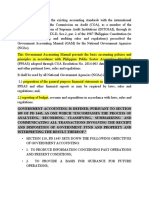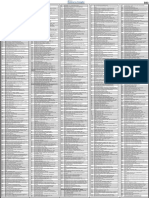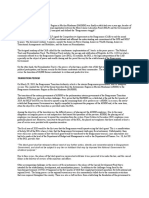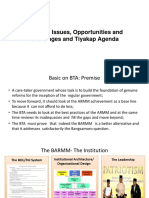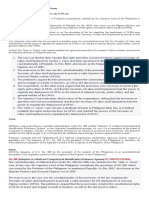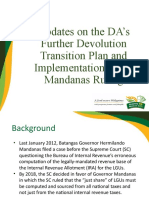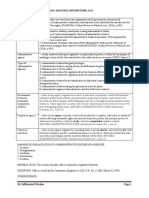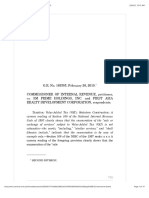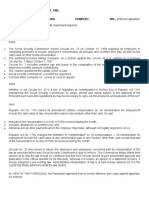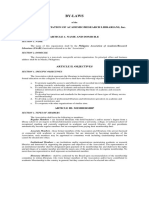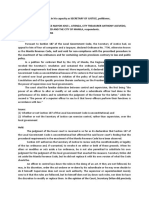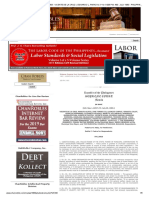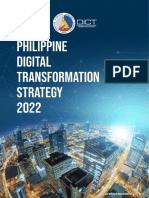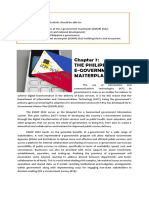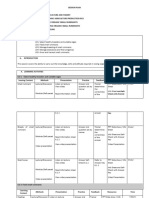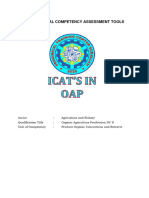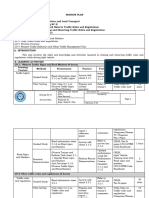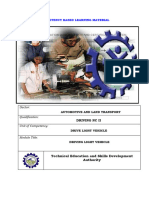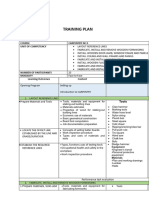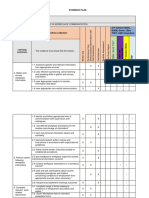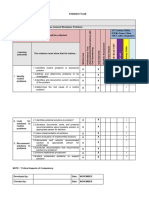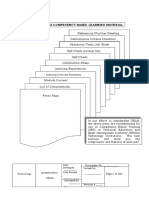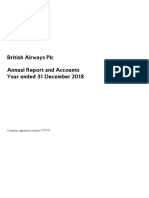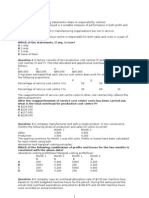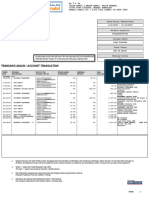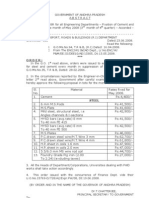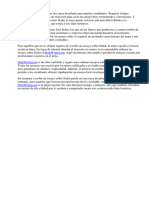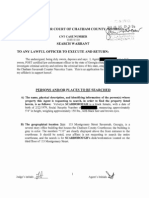CONCEPTUAL FRAMEWORK OF THE
DIGITAL GOVERNMENT MASTERPLAN 2023-2028
RATIONALE
The use of information and communications technology (ICT) in government is seen
as an enabler for nations to achieve digital transformation in the delivery of basic services.
The recent United Nations E-Government Survey1 published in October 2022,
provides an assessment of the digital government landscape across all 193 Member States.
The survey monitors the E-Government Development Index (EGDI), a composite index that
measures the willingness and capacity of a country to use ICT to deliver public services. The
Philippines ranked 89 of 193 countries in 2022, 12 notches down compared to 77 out of 193 in
2020 with a score of 0.6523. This significant decline in the EGDI underscores the need for the
government to reflect and revisit its strategies to recover and improve its e-government
performance. The figure below graphically illustrates the Philippines’ declining rank in the
said survey from 2016-2018.
Figure 1. E-Government Development Index (Philippines)
As the Philippines thrives to improve and establish an integrated digital economy,
public governance at the national level is likewise dynamically evolving through emerging
technology, innovative solutions, and interoperable platforms.
During the First State of the Nation Address (SONA) of President Ferdinand R.
Marcos, Jr., he expressed his intentions to seek streamlining and digitalization of
government processes for more efficient delivery of public services through the development
1
https://publicadministration.un.org/egovkb/en-us/Reports/UN-E-Government-Survey-2022
Carlos P. Garcia Avenue Diliman, Quezon City 1101, Metro Manila, Philippines
+632 8920-0101 | www.dict.gov.ph
�of the E-Governance Act which shall provide the establishment of the E-Government Master
Plan to cover all e-government services and processes. Likewise, the Department of
Information and Communications Technology (DICT) Secretary Ivan John E. Uy aspires to
simplify government transaction processes through digitalization to limit interactions with
people and make it easier to access government services. With this, the DICT seeks to
intensify its efforts in carrying out its mission to establish a One Digitized Government for
the nation through the development of the Digital Government Masterplan (DGMP)
2023-2028 which is targeted to be released by June 2023.
The DGMP 2023-2028 shall serve as a successor of the E-Government Masterplan
(EGMP) 2022, launched in 2019, which seeks to harmonize and coordinate all ICT initiatives
to optimize available government ICT resources, encourage information and
resource-sharing and database-building, and ensure the development and protection of an
integrated government ICT infrastructure.
Likewise, the DGMP 2023-2028 shall focus on the convergence programs intended to
equip the national government with the necessary technologies and skills to achieve a
digitally-enabled administration capable of delivering efficient, fast and quality basic
services which cut across the whole-of-government.
Each of the government agencies and instrumentalities shall adhere to re-imagining a
Philippine bureaucracy that is more efficient, more relevant, and more responsive to the
needs of the changing times and the social realities of the nation. The concept by which the
DGMP operates is predicated on leveraging ICTs to address issues, both perennial and
peculiar to the country; all the while, ensuring that sufficient support interventions are
institutionalized for public service continuity.
This revolutionary novel approach is requisite on stakeholders’ attribution of digital
governance initiatives, and their commitment towards embracing ICTs as a functional
enabler of service delivery.
VISION (for updating and consultation with stakeholders)
The DGMP 2023-2028 envisions a prosperous, inclusive, and resilient society driven
by a digitally transformed government that is citizen-centric, integrated, secured, and
transparent.
OBJECTIVES
Through digital transformation, the DGMP 2023-2028 seeks to address the following
objectives:
1. Establish a connected and digital economy that provides wealth, stability,
sustainability, and is safe for all;
Page 2 of 8
� 2. Achieve a digital society that has the capacity and expertise to utilize and take
advantage of digital technologies; and
3. Create an ICT sector that continuously evolves and grows as new and
innovative technologies become available.
In the advent of government digital transformation, DGMP 2023-2028 is expected to:
1. Enhance public services through ICTs, government rules and regulations;
2. Harmonize interactions and cross-dependencies of government processes;
3. Ubiquitous integrated, secured and resilient digital infrastructure; and
4. Strengthen upskilling, reskilling, and retooling.
STRATEGIES
The Philippine Digital Government Architecture Framework of the DGMP 2023-2208
shall outline the interactions and cross-dependencies of government processes, in the
achievement of the priorities of the current administration, anchored on post-pandemic
recovery and regaining the stature of the Philippines as an economic gravitas. It is anchored
to national plans such as the AmBisyon Natin 2040 and Philippine Development Plan
2023-2028.
Figure 2: Digital Government Architecture Framework
At its core, the DGMP 2023-2028 envisions to lay the groundwork for fully
implementing strategies geared towards the digital transformation of the government to
Page 3 of 8
�improve public service delivery, integrate and secure government digital infrastructure,
empower its workforce, businesses, and citizens.
To help realize the vision of the DGMP 2023-2028, the DICT shall take the lead
towards a digital government through the following strategies:
● Improved Public Service through Digital Government System - providing
a more efficient service delivery platform that shall consolidate all online
government services.
● Integrated and Secured Digital Infrastructure - catering digital
applications, systems, and services that are reliable, effective, stable
and resilient e-government services.
● Empowered Digital Government Workforce - enhancing the capacity
and capability of the government workforce to improve internal
efficiency and public service delivery.
● Inclusive Digital Society - offering a citizen-centric government
information and services to all.
A. Improved Public Service through Digital Government System
The rapid growth of ICT has usually overtaken the speed by which legislation
is passed, and this presents an opportunity to introduce technology-neutral
principles to close the gap in-between governance structures. To effect this
foundational regard for enhanced public services through ICTs, government rules
and regulations must also be evaluated, regularly updated, and assessed for their
sectoral impacts.
It is important for the successor of the EGMP 2022 to strengthen policy areas
by developing and institutionalizing policies that will guide all branches of the
bureaucracy pertaining to information management and effective e-government
services such as the E-Governance Bill which aims to equip the government and the
public to capitalize on the usage of ICT. The Legislative Branch shall also be apprised
of the trends in e-government to develop legislative interventions that are responsive
to the current trends.
a. Digitization
Digitization is the process of converting analog information or procedure into
digital format. It serves as the backbone for data recording, making it an
important part of the digitalization operations of the government. It concerns
conducting an inventory of ICT systems and infrastructure, establishing key
Page 4 of 8
� registries, and strengthening ICT competency and skills standards, among
others.
i. Records and Knowledge Management Information System
A records and knowledge management information system shall be
designed to systematically and efficiently manage government
documents, records and knowledge products and services. This
includes the digitization of paper-based documents, records and
knowledge products and services, as well as the re-engineering and
digitalization of paper-based workflows
ii. Government Public Key Infrastructure Program
The DICT shall encourage and promote the use of Government PKI
digital certificates that shall allow paperless transactions and remote
approval of signatories in the government. This would reduce red
tape, therefore enforcing Ease of Doing Business.
iii. Human Capital Management Information System
A Human Capital Management Information System (HCMIS) shall be
developed in order to eliminate paper-based and manual human
resource (HR)-related processes. Consistent with the applicable civil
service laws and rules, HCMIS shall automate HR-related functions in
the government.
iv. Strengthen ICT Competency and Skills Standards
Development of national ICT competency standards, competency
certification, personnel qualification standards and career pathing,
ensuring that these are at par with the international workforce.
b. Digitalization
Digitalization is the process of using digital technologies to enhance the
operations of the government and provide new revenue and value-producing
opportunities. It increases productivity, efficiency and agility in government
operations by improving existing processes through the development of
application programming interfaces (APIs), promoting the use of common
applications, and empowering government employees.
i. Philippine Government Interoperability Framework
Page 5 of 8
� A Philippine government interoperability framework shall guide and
govern the basic technical and informational interoperability of
government ICT systems. Such a framework shall provide shared
operations and services of the Philippine government, between and
among its various agencies, as well as for these agencies in dealing
with their various constituencies.
ii. Government Digital Payment Systems for Collection and
Disbursement
An internet based electronic payment facility and gateway that will
enable citizens and businesses to remit and receive payments
electronically or from government agencies shall be created. It shall
render services through various delivery channels, which include
debit instructions (ATM accounts), credit instructions (credit cards)
and mobile wallets (mobile application/SMS).
iii. Procurement System
A modernized Philippine Government Procurement System shall be
developed and implemented to provide an auditable online system
that encompasses all procurement and supply chain management
processes involving bidding, contract management, delivery,
acceptance and payment for services or supplies.
iv. Online Public Service Portal
Complementing the Citizen Frontline Delivery Services Platform, an
Online Public Service Portal shall be made accessible, through digital
platforms, such as the internet and other information and
communications technologies, to citizens of the Philippines, foreign
nationals who have been lawfully admitted in the country, and
businesses organized and existing or operating under the laws and
rules of the Philippines for purposes consistent with the efficient
delivery of public services.
c. Digital Transformation
Digital transformation is the process of optimizing, reconstructing, and
integrating digital technology into all areas of the government, to maximize
resource configuration, improve operational efficiency and innovation
capability, and enhance value delivery to stakeholders. A
digitally-transformed government leverages ICT knowledge and encourages
Page 6 of 8
� sectoral applications, improves agency-specific applications, and reinforces
governance mechanisms such as GCIO and CISO Councils.
i. Integrated Government Network
An integrated, dedicated, interconnected, interoperable, secure and
resilient government network, to be known as the “Integrated
Government Network” (IGN) shall be established to act as the
primary means for the sharing and communication of resources,
information, and data through digital and electronic platforms across
all agencies of the government, covering all branches, agencies,
instrumentalities, and offices of the national and local government,
including government-owned and controlled corporations.
ii. Integrated Local Government Unit System
LGUs shall establish their own portal or utilize the ILGU developed
by the DICT, its equivalent programs and systems thereof.
iii. Citizen Frontline Delivery Services Platform
Services that are needed to facilitate business and non-business
transactions referring to permitting, licensing, and the issuance of any
privilege, right, reward, clearance, authorization, or concession,
including frontline services enrolled in the existing citizen’s charter,
shall be made efficient by integrating all agencies involved into one
platform and shall be made available in a form of portal, mobile
applications and other applicable variations thereof.
iv. Integrated Financial Management Information System
To ensure fiscal discipline, fund allocation efficiency and operational
efficiency in the delivery of public services, an IFMIS shall be jointly
developed by the DBM, Department of Finance (DOF), Commission
on Audit (COA), and DICT. This shall harmonize all existing financial
systems in the government to enable real-time, online accounting,
monitoring, and control of obligations and disbursements and directly
link these to cash management.
B. Integrated and Secured Government Infrastructure
The integrated government infrastructure caters to digital applications,
systems, and services. The stability of foundational ICT infrastructure is crucial as it
enhances interoperability within government, across regions and with citizens who
need to access services.
Page 7 of 8
� A secured government infrastructure and environment are necessary to
ensure the reliability, effectiveness, stability and resilience of all e-government
services. This requires addressing hardware, software, and human capacities through
capability development and training on emerging technology trends as identified.
C. Empowered Digital Government Workforce
Enhance the capacity and capability of the government workforce through upskilling
and reskilling to improve internal efficiency and public service delivery and to
promote ICT capacity development to create quality jobs and increase the
employability of the Philippine workforce.
D. Inclusive Digital Society
Businesses and citizens will be competent at adopting and integrating digital
technologies into their lives and embrace the benefits of e-government.
Page 8 of 8




